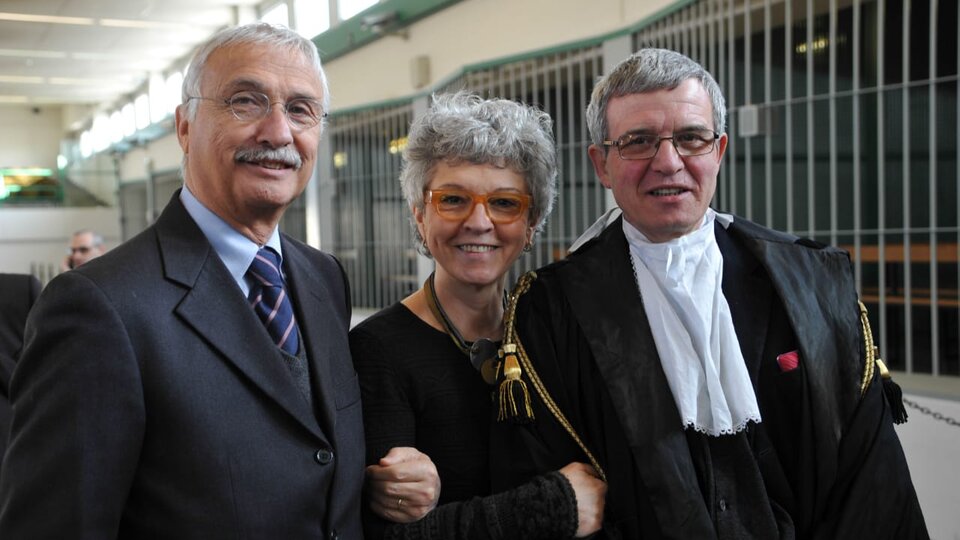
[ad_1]
From Rome
This Thursday, when the Supreme Court of Italy was to announce the final judgments on the process against 18 Latin American soldiers the terrifying Plan Condor, for the crimes of kidnapping, torture and disappearance of 43 Latin American citizens of Italian origin, the announcement has been postponed lack of certain documents.
The session was held at the Supreme Court, located in a huge building facing the Tiber in Rome and near St. Peter’s Vatican Basilica. The building, built between 1888 and 1910, is so overly filled with marble sculptures and decorations that some long ago called it the “Palazzaccio” (or horrible palace) of Rome.
In the Aula Magna, where the Condor Process session was held on Thursday, a room with columns and paintings alluding to ancient Roman law, 7 judges and at least 17 lawyers were seated, along with a few relatives of the missing and journalists. .
The session was very long, much longer than expected. A judge read aloud for almost an hour and a half the motives (and other aggravations) of the life sentences of the Court of Appeal, the second judicial instance of the three in Italy, then the lawyers took the speech. Regarding these sentences handed down in 2019, several defendants have appealed (three Chileans have not done so and their life sentences are now final) before the Supreme Court and this is what the highest court must decide. But since two of the defendants were recently deceased (a Uruguayan and a Peruvian) and the court had not received the corresponding certificates, the hearing was suspended until Friday at 1:30 p.m. in Italy, pending certificates. It is possible that the convictions will be known on Friday but there has been no official communication on this subject.
Of the 43 victims, 4 were Chileans kidnapped in Chile, 13 Uruguayans kidnapped in Argentina, 6 Argentines kidnapped in Argentina, Bolivia, Paraguay and Brazil. To these are added 20 other Uruguayans kidnapped in Argentina but whose disappearance is attributed to only one of the defendants, Jorge Nestor Troccoli, who was a member of the intelligence service of the Uruguayan Navy (FUSNA) and lives in Italy. During the Condor Plan, an agreement between the dictatorships of Chile, Argentina, Uruguay, Paraguay, Bolivia and Peru, among others, those kidnapped or detained were transferred from country to country. other, tortured, murdered and made disappear without the country to which they could appear responsible.
22 years of trials and 100 hearings
Cristina Mihura, Uruguayan, is the widow of Italian-Uruguayan Bernardo Arnone with whom she was married for almost two years, until he was kidnapped in Buenos Aires, where they had gone to live while fleeing the Uruguay.. But although they changed residences, the Condor Plan did its part. Armando was taken away in 1976 and we never heard from him again. She left as a refugee for Europe and was first a refugee in Sweden. Then he came to Italy. She was never able to recover her husband’s remains.
“In 1999 the Condor process beganThen there were endless years of preliminary phase, then the secret hearings before the preliminary hearings judge (GUP), then the first instance trial in the courtroom of Rebibbia prison, then the appeal trial. and now this one. Looking back and having attended a hundred or so hearings, I would say that we had several difficult times and several important ones, ”said Mihura. PageI12.
-What was the most important moment for you?
-The most important for me was the June 9, 1999When we were able to file a complaint with other family members, all women, many Uruguayans and an Argentinian, because at that time impunity reigned in our countries and there was no way forward. The activities of Judge Baltasar Garzón in Spain calling for Pinochet’s arrest have been significant. Because in Uruguay, there were laws of expiration, in Argentina those of obedience and end point, graces. Something similar was happening in Chile. Thanks to this Italian law which makes it possible to prosecute crimes against Italians abroad, we have been able to carry out this cause which has lasted 22 years. Neither in Germany nor in France could provoke causes like this because it does not work like here.
– Apart from the convictions, what left this important trial?
– This trial made it possible to put crimes of this nature, the actions of dictatorships, on the international level. It was very important for Uruguay to be able to remove this kind of cement blanket which had gone unpunished and which had become very resistant. When things in our countries started to move, the Italian trial might seem superfluous. But it was not. This procedure has always served as a frame of reference. If this Italian trial had not existed, I do not know where the processes initiated in Uruguay would have ended.
-Have you attended nearly 100 hearings of the three trials, what were the most difficult times?
-The arrears, the time it took for everything.
-And the happiest?
-One of the happiest moments for me was when the sentence of the Court of Appeal completely changed that of the first instance and condemned all the participants. Only a part of them were sentenced elsewhere. I hope the Supreme Court will uphold the convictions on appeal. And I hope the trial ends here. After securing convictions in Argentina, Uruguay and Italy for the Bernardo case, I think I will consider myself retired. It has been a tremendous job. It is time to end it. However, I will continue to search for his remains.
.
[ad_2]
Source link
 Naaju Breaking News, Live Updates, Latest Headlines, Viral News, Top Stories, Trending Topics, Videos
Naaju Breaking News, Live Updates, Latest Headlines, Viral News, Top Stories, Trending Topics, Videos